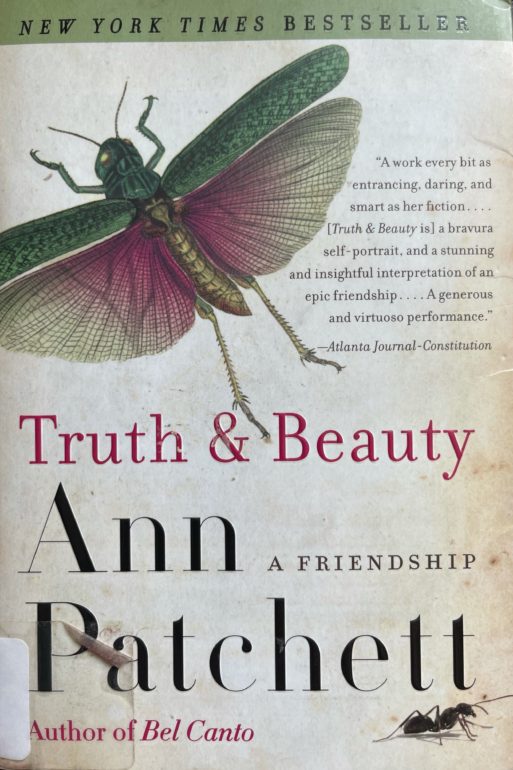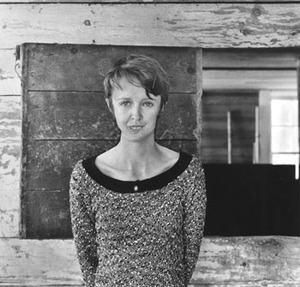 I rarely make it through an entire book without leaving a few notes and dog-earing a couple pages, but by the end of Truth & Beauty, I was surprised to find every page unmarked and unbent. I picked up the book and once I started, I couldn’t put it down. I was mesmerized by Patchett’s voice from the beginning, and when I came to the end, I wanted more. For a first attempt at memoir writing, Ann Patchett has done an exquisite job.
I rarely make it through an entire book without leaving a few notes and dog-earing a couple pages, but by the end of Truth & Beauty, I was surprised to find every page unmarked and unbent. I picked up the book and once I started, I couldn’t put it down. I was mesmerized by Patchett’s voice from the beginning, and when I came to the end, I wanted more. For a first attempt at memoir writing, Ann Patchett has done an exquisite job.
Truth & Beauty follows the long, intense friendship between Ann Patchett, author of notable works of fiction like Bel Canto and The Magician’s Assistant, and Lucy Grealy, the famed poet and writer of Autobiography of a Face. Patchett and Grealy were acquaintances during college, but they became fast friends when they started living together while attending graduate school at the Iowa Writer’s Workshop. From then on, they embarked on a friendship that would span over twenty years. Together, they would navigate relationships, career paths, rising fame, rejection and cancer.
While being recognized for her work, Lucy Grealy is most famous for her face. As recounted in her memoir, she was diagnosed with cancer in her jaw as a child and had to endure years of endless chemotherapy, radiation, and reconstructive surgeries. The constant reshaping of her face plagued Grealy with overwhelming insecurities even as she racked up friends and acquaintances wherever she went. As Patchett writes, “Even at Sarah Lawrence, a school full of models and actresses and millionaire daughters of industry, everyone knew Lucy and everyone knew her story: she had had Ewing’s sarcoma at the age of nine, had lived through five years of the most brutal radiation and chemotherapy, and then undergone a series of reconstructive surgeries that were largely
unsuccessful. The drama of her life, combined with her reputation for being the smartest student in all of her classes, made her the campus mascot, the favorite pet in her dirty jeans and oversized Irish sweaters” (2). Patchett conveys this with both weariness and tenderness because as much as she adored Lucy, it becomes obvious through reading the book that the story inevitably ended up being about Lucy.
When you’re a woman and you have a best female friend, there are undoubtedly times when you share happiness for her successes and other times when you grieve with her through her losses. When you have a talented writer for a friend who’s also dealing with a chronic illness, those ups and downs increase tenfold. Despite the hordes of friends who obviously love her, Lucy finds herself unable to find “true love,” the thing she wants most in life. “The question of love was a dark hole into which Lucy swam daily,” writes Patchett. “She claimed to be alone, alone, alone, and bringing up the legions of friends who adored her was only an irritant” (169). As she continues to ache for her idea of real love, her life begins to unravel—bills go perpetually unpaid, her fame subsides, and relationships reach dead ends. By the time we read about Lucy passing away, we are fully prepared for her death and yet heartbroken nonetheless.
“The question of love was a dark hole into which Lucy swam daily.”
Ann Patchett does brilliant work cataloging their friendship and portraying Lucy as a troubled, deeply sympathetic character. By openly acknowledging her own struggles and flaws, we are given a portrait of what it means to be a truly committed friend. Patchett writes that Lucy “had a nearly romantic relationship with Death. She had beaten it out so many times… she believed that the most basic rules of life did not apply to her, and over the course of our friendship, without me knowing when it had happened, I had come to believe it myself” (257). By accepting Lucy’s death and remembering her as a life-changing friend in this book, we can all learn something about what it means to cherish the loved ones in our lives and celebrate those who have passed.
Related Articles:
How to Help a Friend with Cancer
Supporting a Friend Who has Cancer

 Truth & Beauty by Ann Patchett
Truth & Beauty by Ann Patchett




 Funeral Favors Offer Visitors a Tangible Memento
Funeral Favors Offer Visitors a Tangible Memento
 “Comeback” by Prince
“Comeback” by Prince















